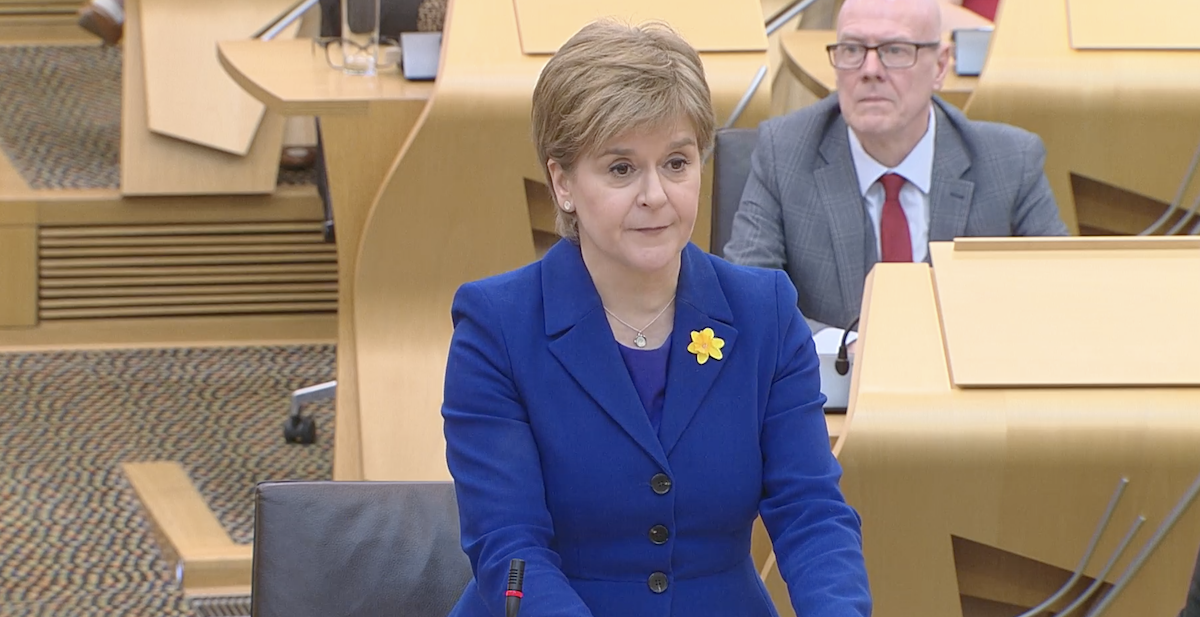Fiery exchanges and warm words as Nicola Sturgeon bows out
Scotland’s longest-serving and first female First Minister faces tough questions on her record at her final First Minister’s Questions
It may be the end of an era in Scottish politics but if outgoing First Minister Nicola Sturgeon expected an easy ride on her final First Minister’s Questions, the opposition leaders had other ideas. The warm tributes and thanks for her long service were left until later in the afternoon, while at FMQs she faced some fierce exchanges about her government’s record in office.
The Leader of the Scottish Conservatives Douglas Ross chose to begin his questioning by raising doubts over the integrity of the SNP as the party of government, highlighting recent revelations about journalists being misled about membership numbers. Mr Ross claimed the SNP was “collapsing”. In response Ms Sturgeon attempted to deflect the criticisms by questioning Mr Ross’s priorities and challenging him to reveal his own party’s membership numbers.
Mr Ross then went on to attack Ms Sturgeon’s record in office, claiming: “On Nicola Sturgeon’s watch, Scotland’s schools have plummeted down international league tables. She has made no progress on the attainment gap and broke her promise to close it completely. The Named Persons Act, the Hate Crime Act, the Gender Recognition Bill were all unworkable. Drug deaths in Scotland are the highest in Europe – five times higher than anywhere else in the UK. One in seven Scots are on an NHS waiting list right now. And on her final day in this chamber as First Minister, a cross-party committee of this parliament delivered a damning report on ferries.”
Countering Mr Ross, Ms Sturgeon said she was “proud of the record of the government I have led, in some of the toughest times that Scotland has faced in recent history.” She went on to list a raft of policies she would like to claim as a more positive legacy, which included progressive income tax, the Scottish Child Payment, the baby box, a national investment bank, abolishing prescription charges, minimum unit pricing, climate change policies, the domestic abuse act, free period products and expanded childcare.
Labour Leader Anas Sarwar also attacked the SNP’s record in government, in particular raising the cost-of-living crisis and the current challenges for the NHS, claiming “there is not a single Scottish institution that is stronger now than when her party took office.” Ms Sturgeon hit back, saying Anas Sarwar was “just wrong” and pointing to new institutions like Revenue Scotland and Social Security Scotland that did not exist before her government took office.
The Labour party are calling for an immediate general election, claiming there is no mandate for Ms Sturgeon’s successor as First Minister. Mr Sarwar quoted back Ms Sturgeon’s own words in relation to the Conservative leadership crisis at Westminster five months ago, that “an Election is now a democratic imperative”. Mr Sarwar said: “as her potential successors squabble over their own record in government – they can’t escape facts. They don’t have a plan for Scotland – they don’t have a mandate from the public and that is why we need an election now.”
For the Liberal Democrats, Alex Cole-Hamilton focussed on the Scottish Government’s record on mental health, claiming the treatment targets set shortly after Ms Sturgeon took office had never been met, while the Office of Mental Health Minister had been quietly downgraded and mental health funding slashed. Mr Cole-Hamilton said “there is a sea of human pain out there, so much unmet need. Don’t just tell me that this is unacceptable. At this late hour, at the last and final time of asking, will the First Minister admit her government has failed Scotland on mental health?” In response, Ms Sturgeon agreed there was “much much more work to do” but pointed to reduced stigma in mental health as a positive step, and claimed they were now seeing sustained improvements in CAMS waiting lists.
The tone of exchanges was far warmer and less robust following FMQs when the First Minister made her resignation statement. Douglas Ross recognised the legacy of her achievements as a “working class girl from Ayshire” and “the positive message it sends that in Scotland every child should have the ability to reach the heights that they dream of.” Mr Sarwar recognised areas where he and Nicola Sturgeon had attempted to build consensus, “particularly in calling out the rising levels of prejudice and hate in society”. Alex Cole-Hamilton also identified areas of common ground with lib dems, such as “the physical punishment of children, on alcohol pricing, on advancing the rights of Scotland’s LGBT+ community”. He praised the First Minister’s “tireless commitment” during the pandemic response and pointed out that “As the first woman to achieve this office of First Minister, Nicola Sturgeon has provided inspiration to the women and girls who will doubtless follow her to this, the highest office in the land.”
Debate may continue to rage over her legacy and achievements, but Nicola Sturgeon’s lasting influence on Scottish political life is recognised across political divides.
